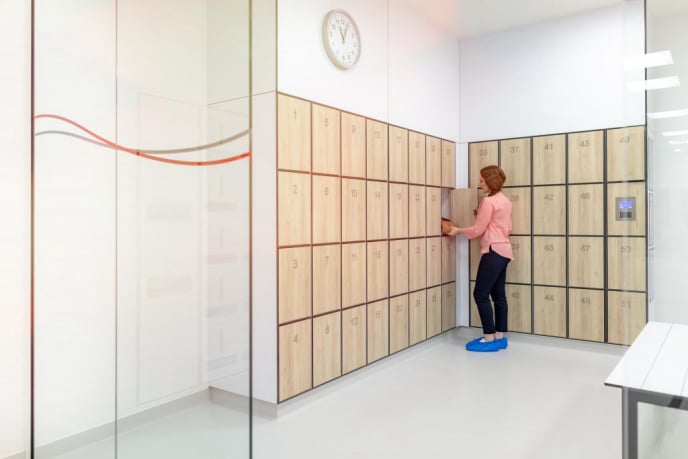AI and Automation Enhancing Efficiency
Artificial intelligence and automation are playing a crucial role in the development of smart lockers. AI-powered lockers can optimize storage space by analyzing package sizes and adjusting compartment allocations accordingly.
Automated sorting and retrieval systems ensure that items are placed in the most efficient locations, reducing wait times for users. Machine learning algorithms are also improving security by detecting suspicious activities, identifying unauthorized access attempts, and providing real-time alerts. These advancements are making smart lockers not only more intelligent but also more reliable for both businesses and consumers.
Biometric Authentication for Enhanced Security
Security remains a top priority in smart locker development, and biometric authentication is becoming a game-changer. Traditional PIN codes and QR codes are being replaced or supplemented by fingerprint scanning, facial recognition, and even voice recognition technology. These methods provide an additional layer of security, ensuring that only authorized users can access their designated lockers. With concerns over data privacy and fraud increasing, biometric security is expected to become a standard feature in future smart locker systems.
Contactless and Mobile-First Solutions
As consumer preferences shift toward seamless and contactless experiences, smart lockers are adapting with mobile-first solutions. Mobile apps are now enabling users to unlock lockers, track deliveries, and manage pick-up times without needing physical interaction. NFC (Near Field Communication) and Bluetooth technology allow for automatic locker access when a user’s smartphone is nearby, streamlining the process further. These innovations are particularly beneficial in high-traffic areas such as retail stores, office buildings, and apartment complexes where speed and convenience are crucial.
Integration with IoT and Smart Cities
The integration of smart lockers with the Internet of Things (IoT) is transforming how cities and businesses manage logistics. Connected lockers can communicate with delivery networks, traffic management systems, and inventory tracking platforms to optimize last-mile delivery. In smart cities, locker networks are being placed in strategic locations to facilitate 24/7 access for residents, reducing congestion and improving efficiency in urban areas. By leveraging IoT, smart lockers are becoming an essential part of the digital infrastructure, streamlining everything from grocery deliveries to pharmaceutical distribution.
Sustainability and Eco-Friendly Innovations
Environmental concerns are driving the adoption of eco-friendly smart locker solutions. Companies are developing lockers made from sustainable materials, utilizing solar power, and implementing energy-efficient features. These efforts not only reduce the carbon footprint of logistics operations but also appeal to environmentally conscious consumers. Additionally, smart lockers contribute to sustainability by minimizing the need for multiple delivery attempts, thus cutting down on fuel consumption and emissions. In the future, sustainability will play an even bigger role in shaping the design and functionality of smart locker systems.
Personalized and On-Demand Services
Personalization is becoming a key trend in smart locker solutions, as businesses look to offer tailored experiences for their customers. Some lockers now provide temperature-controlled compartments for groceries and perishable items, while others offer charging ports for electronic devices. Businesses are also using AI-driven analytics to offer customized recommendations and services based on user preferences. The ability to provide on-demand solutions, such as temporary storage for travelers or secure drop-off points for high-value goods, is making smart lockers more versatile than ever.
The Future of Smart Locker Solutions
Looking ahead, smart lockers are expected to become even more integrated into daily life, offering faster, more secure, and personalized solutions for a wide range of industries. AI and automation will continue to refine the efficiency of these systems, while biometric authentication and mobile-first solutions will enhance security and convenience. As cities and businesses invest in smart infrastructure, the role of smart lockers in logistics, retail, and public services will continue to expand. With a strong focus on sustainability and personalization, the future of smart locker solutions is set to revolutionize how goods and services are delivered and stored in an increasingly digital world.
